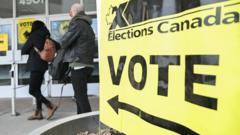As Canadians prepare to vote in a consequential election, the political landscape has been radically reshaped by external influences, particularly from US President Donald Trump. Initially, the Conservatives, under the leadership of Pierre Poilievre, appeared poised for a decisive victory. However, mounting tensions stemming from Trump's tariffs and his remarks about Canada potentially becoming the "51st state" have injected new life into Mark Carney's Liberal Party.
Recent polls indicate a tighter race between the parties, with the Liberals slightly leading, as the election campaign reaches its climax. Over the past 36 days, public sentiment has been deeply impacted by the rhetoric surrounding Canadian identity and nationalism, notably illustrated by fans booing the US national anthem at hockey games—an unprecedented display of frustration.
The final days of campaigning have been overshadowed by a tragic car ramming incident in Vancouver that resulted in the loss of 11 lives. Carney, the current Prime Minister, promptly addressed the nation following the attack and spoke out against the incident during a day of campaigning across multiple provinces. Poilievre also sought to connect with community members, particularly within the Filipino community, in the wake of the attack.
Trump's tariffs—imposed at 25%—and continued threats to annex Canada have intensified feelings of anger and national pride within the electorate. Carney has sought to position himself as the candidate best prepared to shield Canada from Trump's policies, emphasizing the need to pivot and strengthen ties with partners beyond the United States, such as the UK and EU.
As the campaign nears its conclusion, Poilievre has focused on appealing to voters frustrated with the current government's policies, attributing rising costs of living and crime to "the lost Liberal decade."
The election also represents a challenge for smaller political parties like the New Democratic Party (NDP) and the Bloc Québécois. The NDP, led by Jagmeet Singh, finds itself struggling in the polls, while their ability to act as a counterbalance to the Liberal and Conservative parties is in jeopardy.
Historically, Canadian governance has been dominated by either the Liberals or the Conservatives, a trend that appears to persist in light of the current political climate. While Trump himself has refrained from directly commenting on the Canadian election, the rhetoric from his administration continues to circulate, further polarizing Canadian voters.
Polls are set to open across the country, including a record number of advance ballots cast by over 7 million Canadians, indicating heightened engagement and interest in the electoral process amid these turbulent times.




















